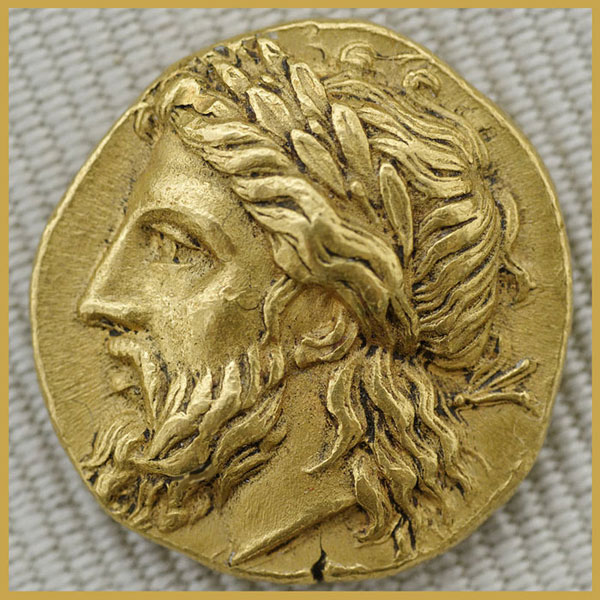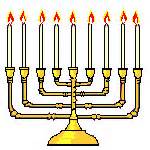
What is the Meaning of HANUKKAH?
Who is the man portrayed above? Do you recognize him? Do Christians honor him on December 25th?
The Greek Seleucid kings allowed the Jews to practice their religion until the Greek-Syrian king, Antiochus IV (175-163 B.C.), known as "Epiphanes" (God Manifest) entered the temple in 168 B.C. and "took away the golden altar and the candlestick of light" and other temple furnishings, broke them in pieces, and carried them off to his own country. "Then the king wrote to his whole kingdom that they should all become one people, and everyone should give up his particular practices. And all the heathen assented ... And many from Israel agreed to his kind of worship and offered sacrifice to idols and broke the sabbath. And the king sent word ... to ... put a stop to whole burnt offerings ... and to break the sabbaths and profane the feasts ... to build ... idol temples and sacrifice hogs and unclean cattle; and to leave their sons uncircumcised and defile themselves with every unclean ... practice, so that they might forget the Law ... and anyone who did not obey ... should die.... he erected a dreadful desecration upon the altar" (1 Macc. 1:41-54). He erected an idolatrous altar on the altar of the Temple (Ant.12:5:4; 12:7:6).
Identifying himself with Jupiter (Zeus), he sacrificed a pig to Jupiter Olympus and sprinkled pig's blood in the Holy of Holies (1 Macc.6:7; 2 Macc.6:2). He killed anyone possessing the Old Testament Scriptures. He came before Christ's first coming just as the Anti-Christ will come before Christ's second coming (Matt.24:15). The last true daily sacrifice took place on the 24th of Chislev. The pagan sacrifices began the next day on the "five and twentieth day of the ninth month" (1 Macc.4:54). Antiochus chose the 25th day of Kislev to set up his idol image in the temple because it was related to the PAGAN WINTER HOLIDAY following the shortest day of the year (called "CHRISTMAS" today). The Romans also observed the 25th of December as the birthday of the sun. If the Abomination of Desolation was a statue of ZEUS (shown above) set up in the Temple on Kislev 25th (near Dec. 25th), do "Christians" today set up similar statues of this man (calling him Jesus) in their churches on or near December 25th today for worship?
Since the second temple was rededicated by the Maccabees on Kislev 25, 164 B.C., the two daily sacrifices were terminated by Antiochus on Tishri 15, 167 B.C., or 1150 days previously. Tishri 15 was the very feast at which Solomon dedicated the first temple. "Hanukkah" actually means "Dedication." When Antiochus demanded that the Jews worship him as a "god," the Jews revolted (168 B.C.). The revolt for religious independence was led by an old priest named Mattathias of Modin and his five sons. He slew an officer sent to compel his submission in 167 BC. The sons were led by Judas who was surnamed Maccabaeus. MaQeBHet is Hebrew for "Hammer" (Isa. 44:12) and gave us the English word MACCABRE. One theory is that this title came from the letters M.K.B.J. on his standard, the initials of the Hebrew words Mi Kamoka Baelim Jehovah -- "Who is like unto thee oh Lord, amongst the gods?", fought the Syrian army occupying Jerusalem and defeated them against enormous odds in 165 B.C. The Jews reconquered the temple site on the 24th day of the ninth month exactly three years to the day after the evil King Antiochus IV had forced the ending of the daily sacrifice. The next day, "Early in the morning on the twenty-fifth day of the ninth month of Chislev ... they rose and offered sacrifice, as the law directs, on the altar of burnt offering which they had built. At the very season and on the very day that the Gentiles had profaned it, it was dedicated with songs" (1 Macc.4:52-54). Jewish Talmudic legend says that a one-day supply of the sacred oil was found hidden away in a wall of the Temple by a priest. When this was brought out to be used to light the lamp, it miraculously lasted for the full eight days of the celebration, until new oil could be made.
On the day before the Feast of Hanukkah, on the 24th of Chislev, there have been at least two other significant events in Israel's history. One was when the foundation for the second Temple was laid in 520 B.C. "From the four and twentieth day of the ninth month, even from the day that the foundation of the Lord's temple was laid, consider it.... From this day I will bless you" (Hag.2:18-19). Jerusalem was also freed from Turkish rule, which lasted almost 400 years until World War 1, on December 9, 1917, the 24th of Chislev. The Turks gave up the city without a shot being fired thinking that "Lord Allenby" was a fulfillment of a prophecy of a "Man of Allah" (Allen - Allah, Beh - man). Today, this "Feast of Dedication" or "Feast of Lights" is commemorated for eight days beginning on the 25th of Chislev. Jesus Christ celebrated this festival (John 10:22-23). In the future, after 1260 days of Great Tribulation, the Jews will mourn for Jesus for 30 days (Deut. 34:8) beginning on Yom Kippur (Zech. 12:10) plus 45 more days (Dan. 12:11) bringing us to Kislev 25, the day the temple will be rededicated to God.
